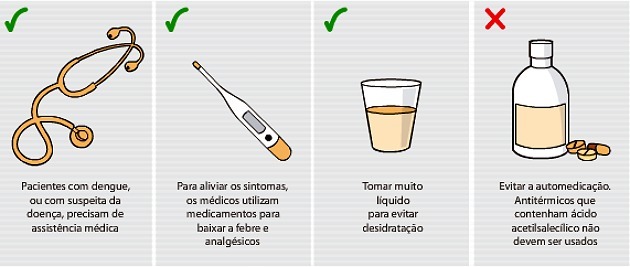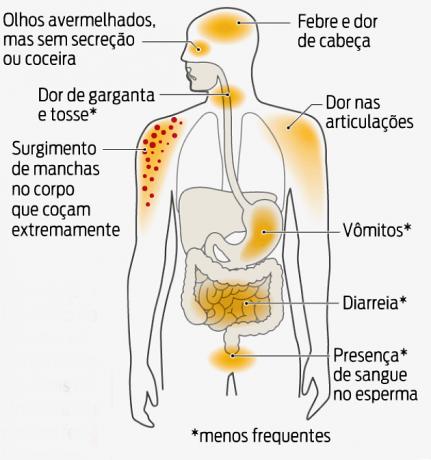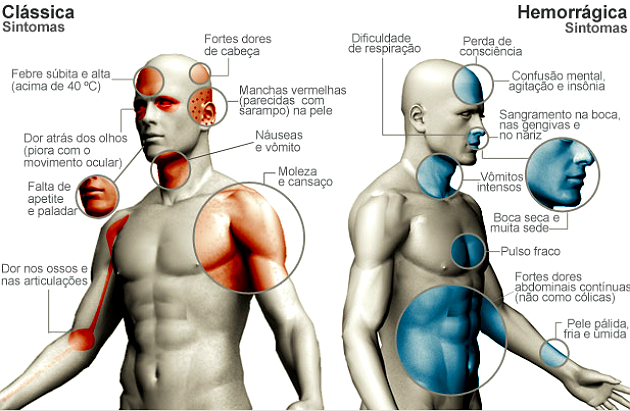THE dengue it is one of the best known infectious tropical diseases in the world. It is caused by a mosquito-borne virus Aedes aegypti.
It is a serious public health problem in tropical countries, where environmental conditions favor the proliferation of the mosquito that transmits the disease.
In Brazil, the Ministry of Health estimates that 500 cities may suffer from outbreaks of the disease in 2019.
Dengue Transmission

Dengue virus is an arbovirus, those that are transmitted by insect bites, belonging to the genus Flavivirus and family Flaviviridae.
Worldwide there are four types of dengue virus. Thus, when a person is infected with a type of serotype, he becomes immune to it.
Dengue vectors are mosquitoes of the genus Aedes, being the species Aedes aegypti responsible for the transmission of dengue in the Americas.
Dengue transmission occurs through the bite of the female mosquito of Aedes aegypti, as long as you are infected with the virus from having previously bitten a person with the virus.
Transmission from person to person is not possible, that is, through contact with the sick person. Likewise, the virus is not transmitted through contaminated food or water.
A person can contract dengue more than once in a lifetime. However, as there are four serotypes, it becomes immune to what has already been contacted.
Dengue Symptoms
Dengue has two main forms, classic dengue and hemorrhagic dengue, which differ in their symptoms. However, in many cases the patient has no symptoms.

Classic Dengue
Classic dengue is the most common and mild form of the disease. Their symptoms are often confused with those of the zika.
The symptoms of classic dengue are usually felt from 7 to 15 days and are as follows:
- High fever (39° to 40°): Sudden onset, being the first symptom to appear;
- Muscle and joint pain;
- Weakness;
- Loss of appetite;
- Nausea and vomiting;
- Headache;
- Pain behind the eyes;
- Spots and itchy skin.
Dengue Hemorrhagic
Dengue hemorrhagic fever is a more severe form of the disease, with symptoms similar to classic dengue at first. However, they are accompanied by other symptoms:
- High fever;
- Unexpected bleeds;
- Enlarged liver;
- Abdominal pain;
- Problems in blood circulation.
Dengue treatment

The treatment of dengue is differentiated according to its type. In general, it is recommended to rest, drink plenty of fluids and not self-medicate.
There is no specific treatment. To alleviate symptoms, analgesics and antipyretics (paracetamol and dipyrone) are administered.
Also, some types of medication such as salicylates and non-hormonal anti-inflammatory drugs should be avoided.
The treatment of dengue hemorrhagic fever, on the other hand, requires greater care, and the patient requires hospitalization.
Dengue prevention
Dengue can only be fought by eliminating mosquitoes from Aedes aegypti. That is why popular participation and campaigns to combat the mosquito must be constant, especially in areas at risk of disease transmission.
The mosquito lays its eggs in standing water. Therefore, eliminating their breeding sites is essential to reduce the proliferation of mosquitoes.
Check out some tips to prevent dengue:
- Avoid accumulation of water in backyards, whether in containers or on the next floor;
- Keep the water tanks closed;
- Make sure there is no water accumulated in old tires;
- Clean water containers for pets;
- Use protective screens on windows and doors;
- Put sand in potted plants;
- Avoid the accumulation of garbage;
- Clean house gutters;
- Use repellents in hazardous areas.


